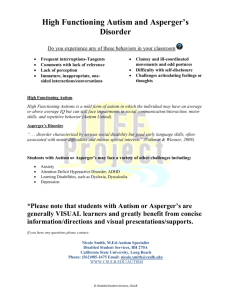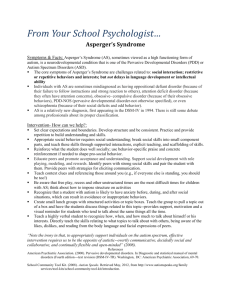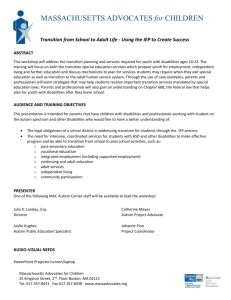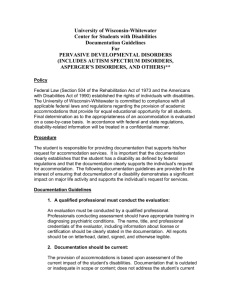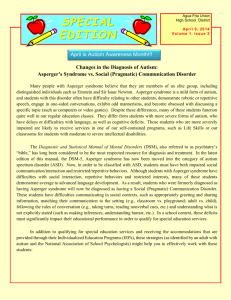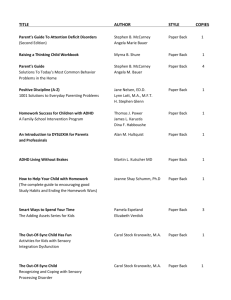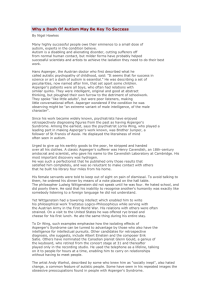Preparing for College
advertisement
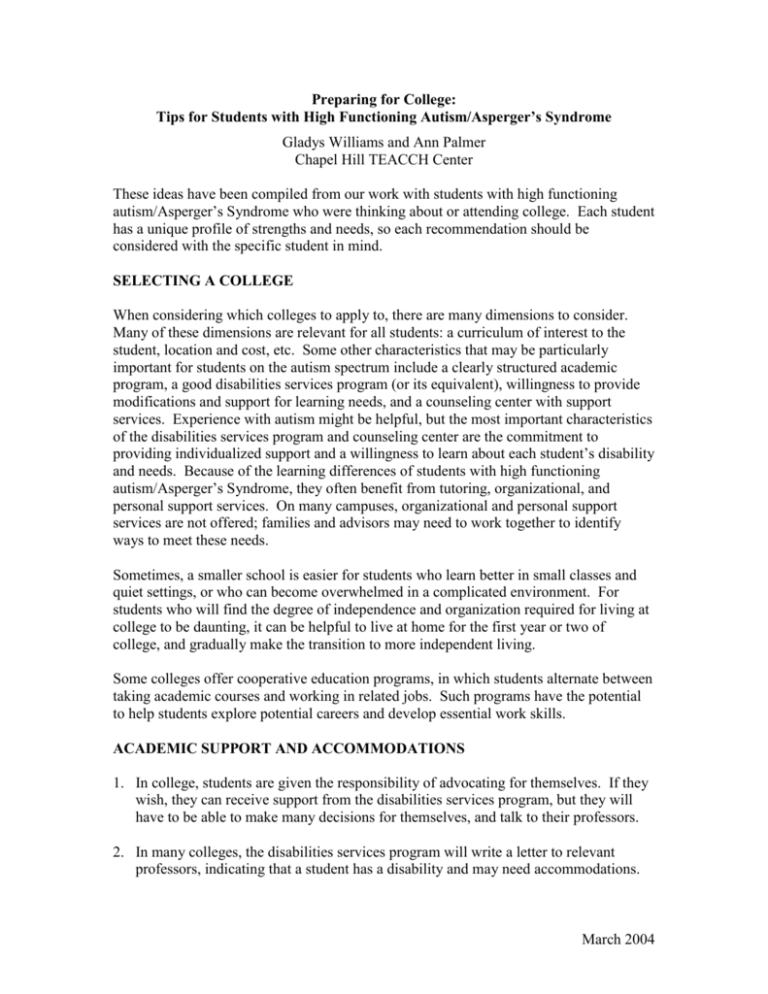
Preparing for College: Tips for Students with High Functioning Autism/Asperger’s Syndrome Gladys Williams and Ann Palmer Chapel Hill TEACCH Center These ideas have been compiled from our work with students with high functioning autism/Asperger’s Syndrome who were thinking about or attending college. Each student has a unique profile of strengths and needs, so each recommendation should be considered with the specific student in mind. SELECTING A COLLEGE When considering which colleges to apply to, there are many dimensions to consider. Many of these dimensions are relevant for all students: a curriculum of interest to the student, location and cost, etc. Some other characteristics that may be particularly important for students on the autism spectrum include a clearly structured academic program, a good disabilities services program (or its equivalent), willingness to provide modifications and support for learning needs, and a counseling center with support services. Experience with autism might be helpful, but the most important characteristics of the disabilities services program and counseling center are the commitment to providing individualized support and a willingness to learn about each student’s disability and needs. Because of the learning differences of students with high functioning autism/Asperger’s Syndrome, they often benefit from tutoring, organizational, and personal support services. On many campuses, organizational and personal support services are not offered; families and advisors may need to work together to identify ways to meet these needs. Sometimes, a smaller school is easier for students who learn better in small classes and quiet settings, or who can become overwhelmed in a complicated environment. For students who will find the degree of independence and organization required for living at college to be daunting, it can be helpful to live at home for the first year or two of college, and gradually make the transition to more independent living. Some colleges offer cooperative education programs, in which students alternate between taking academic courses and working in related jobs. Such programs have the potential to help students explore potential careers and develop essential work skills. ACADEMIC SUPPORT AND ACCOMMODATIONS 1. In college, students are given the responsibility of advocating for themselves. If they wish, they can receive support from the disabilities services program, but they will have to be able to make many decisions for themselves, and talk to their professors. 2. In many colleges, the disabilities services program will write a letter to relevant professors, indicating that a student has a disability and may need accommodations. March 2004 2 This letter might be the student’s responsibility to give to the professor, or it might be sent out to each professor. In either case, it is then likely to be the student’s responsibility to follow up with the professor and request specific accommodations (e.g., seating, time on tests, material in writing). Many students will need coaching and support in order to do this. Some counselors may be willing and able to help with this if asked. Others may not be able to do so. 3. A tutor may be helpful, especially for the more challenging courses and for courses that require students to write papers and do independently structured projects. Tutorial services are often available; the program that provides disabilities services will be able to provide information about what is available and how to access these services. A student may then need guidance about how and when to make use of a tutor. 4. Academic accommodations that have been helpful for some students with Asperger’s/ high functioning autism follow. Many students need a little longer to process information and organize responses. This can mean that they will take a little longer in responding to questions in class. It also means that he or she should receive the accommodation of extra time on tests. Due to difficulties in processing and screening sensory information, a distraction-free environment may be important for ongoing studying, and for taking tests. In lecture halls, seating can be important. Sitting at or close to the front, and sometimes in the center of the row, can make it easier to hear and understand a lecture. Some students find it easier to sit near the front but in an aisle seat, so that they have a bit more room to spread out and are less likely to be bumped. Sometimes seating is on a first-come, first served basis all semester. In this case, students should get to the first class early! Other professors assign seating or have students remain in the same seat all semester. In this case, students may need to talk to the professor in order to arrange for seating needs. Some classes include projects on which students work together in small groups. Sometimes talks must be given in front of the classes. Some professors include class participation as a component of the grade. These requirements can be challenging for students with difficulties in oral communication or in working as part of a group. When this is the case, the student should be advised to talk to the professor about his or her disability early in the semester. In some cases, accommodations may be appropriate. In others, the professor’s understanding and support might suffice. 3 ORGANIZATION It is important to be aware that most students with autism spectrum disorders need clear, systematic organizational strategies for academic work and probably for aspects of daily living. Calendars, checklists, and other visual strategies for organizing activities should be developed with the student. SELECTING COURSES Many students with Asperger’s/high functioning autism will do best in courses that draw on factual memory and/or visual perceptual skills. A sensitive counselor or academic advisor can help guide him or her to a curriculum that will capitalize on his or her strengths and interests. Courses that require abstract verbal reasoning, flexible problem solving, extensive writing, or social reasoning are often challenging. Such courses may be valuable to take, but could require extra time and support. In her book, Pretending to be Normal, Liane Willey, an adult with Asperger’s Syndrome, recommends taking courses in communication and psychology in order to improve social understanding and skills. She comments that sometimes it might be wise to audit a course if it would take a long time to master the material. Course load is an important issue, especially during the first year when everything is new. For some students, a reduced course load can help keep the stress levels more manageable. A related issue is that many students with autism need extra time for thinking about problems and for completing work. This means that they may need longer than most students for reading and doing assignments. This should be taken into account in planning a student’s course load so he or she will not be overwhelmed. SOCIAL LIFE For some students with autism, living on one’s own may be overwhelming at first. They often need more support than most college freshman for making social connections. All campuses have organized social groups and activities; most students with high functioning autism/Asperger’s will enjoy participating in some of these, but will need guidance in finding the right groups and getting introduced. Consider the student’s strengths and interests when looking for groups and activities. It might be beneficial to have someone, perhaps an older student or an advisor, point out groups that would be of interest, and help with the initial steps of becoming a participant. It may also be possible to mobilize other resources through the student counseling services, residence advisors, and service organizations on campus. LIVING IN THE DORMS For many students with high functioning autism, it is preferable to have a single room. This provides them with a sanctuary where they can control their environment, focus on 4 their work and daily activities without distraction, and not be forced to engage in social interaction all the time. Having a roommate can be highly stressful. On the other hand, it is often helpful to have a mentor nearby. When the student is in agreement, it can be helpful to inform the residence staff of the student’s disability and areas in which support may be needed. If the student is comfortable about talking with peers about his disability, it can also be helpful to meet (with support) with some of the students who live in adjacent rooms, and talk with them about the student’s strengths and interests, and why she or he might do some things a bit differently. DAILY LIVING Try to think through various aspects of daily life on campus, to figure out the likely pitfalls, and provide written guidelines, checklists, or advance training/preparation. Here are some examples: meal plans and their rules; where to eat at non meal times; laundry; spending money; budget; using a campus ID and charge card; dorm rules; handling fire drills in the middle of the night; using communal bathrooms; transportation; campus maps; finding rest rooms; using the alarm clock; e-mail and instant messaging; library hours and how to get help from a librarian; how lectures work; learning about and participating in dorm activities; and student health services and medical emergencies (and non-emergencies). First aid and how to take care of oneself during a minor illness (including how to get liquids and food when feeling under the weather) are important. Building in time for physical exercise (perhaps through courses) is important for many individuals, not only for health reasons but also as a factor that helps with stress management. PREPARE IN ADVANCE Thinking about these issues well in advance is important. As part of the IEP process, each student should have a transition plan. Learning the skills necessary for college should be part of this plan. Many important skills that will facilitate success in college can be taught and practiced, at home as well as at school, while the student is in high school. It is important that the student understand what his or her learning needs are, and the types of accommodations that are helpful. In college, he or she will probably find it helpful to talk to advisors and professors about these issues. This will be easier to do when it has been practiced in the more supportive environment of high school. At home, high school students should be learning and practicing daily living and independence skills they will need to live successfully at college. 5 Resources There are brief discussions of college-related topics in Liane Willey’s book, Pretending to be Normal, and in A Parent’s Guide to Asperger Syndrome & High-Functioning Autism, by Sally Ozonoff, Geraldine Dawson, and James McPartland. Aquamarine Blue 5: Personal Stories of College Students with Autism, edited by Dawn PrinceHughes, has 12 essays and an appendix of tips. A recent addition is Succeeding in College with Asperger Syndrome: A Student Guide, by John Harpur, Maria Lawlor, and Michael Fitzgerald. A guide to colleges with programs for students with disabilities: The K & W Guide to Colleges for Students with Learning Disabilities or Attention Deficit Disorder: A Resource Book for Students, Parents and Professionals 6th edition. Published by Princeton Review Publishing, L.L.C., 2315 Broadway, New York, NY 10024 There are a number of websites with advice for students with disabilities (and occasionally autism specifically!), about preparing for or being in college. Some are: The National Clearinghouse for post-Secondary Education of Inidividuals with Disabilities, www.heath.gwu.edu Information on many topics, including a list of some summer transition programs held at colleges and universities Eric Clearinghouse on Disabilities and Gifted Education, http://ericec.org One of their many useful articles, ERIC EC Digest #E620, is “Selecting a College for Students with Learning Disabilities or Attention Deficit Hyperactivity Disorder (ADHD)” A web site from the United Kingdom, University Students with Autism and Asperger’s Syndrome, www.users.dircon.co.uk, has many helpful links and some interesting articles by university students with autism spectrum disorders. North Carolina State University has put some useful guidelines on their web page. Their guide on transitioning from high school to college can be found at www.ncsu.edu/provost/offices/affirm_action/dss/transition_flyer.html These websites have information related to transition and other topics: National Center on Secondary Education and Training, www.ncset.org Opening Doors to Post-Secondary Education and Training, Wisconsin DPI, www.dpi.state.wi.us/dpi/dlsea/een/pdf/tranopndrs.pdf Transition Coalition, www.transitioncoaltion.org The Parents Place of Maryland, www.ppmd.org 6 There are a few colleges we have heard of that have a program specifically for students with Aspergers Syndrome. We do not have any experience with them. More programs may be available, and it is likely others will be developed. The College Support Program for Students with Asperger’s Syndrome Dowling College and The Cody Center at Stony Brook University, Long Island, NY (631) 952-9529 For more information about TEACCH please visit their website at www.teacch.com.

